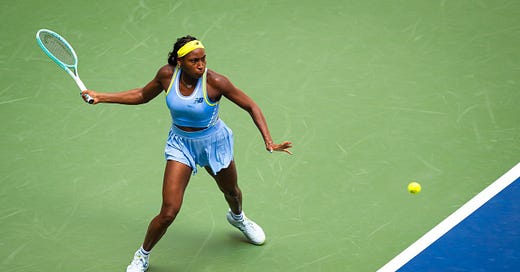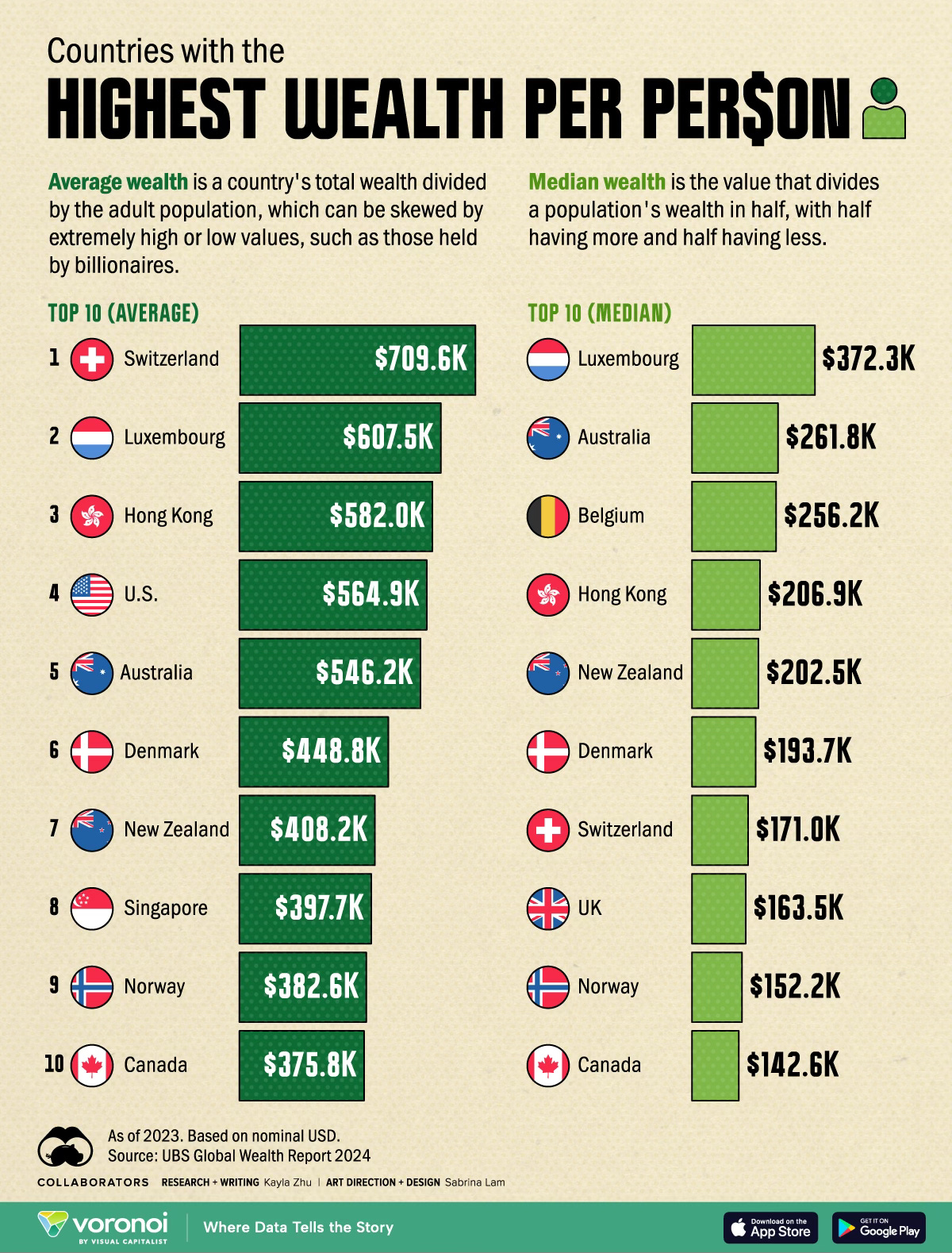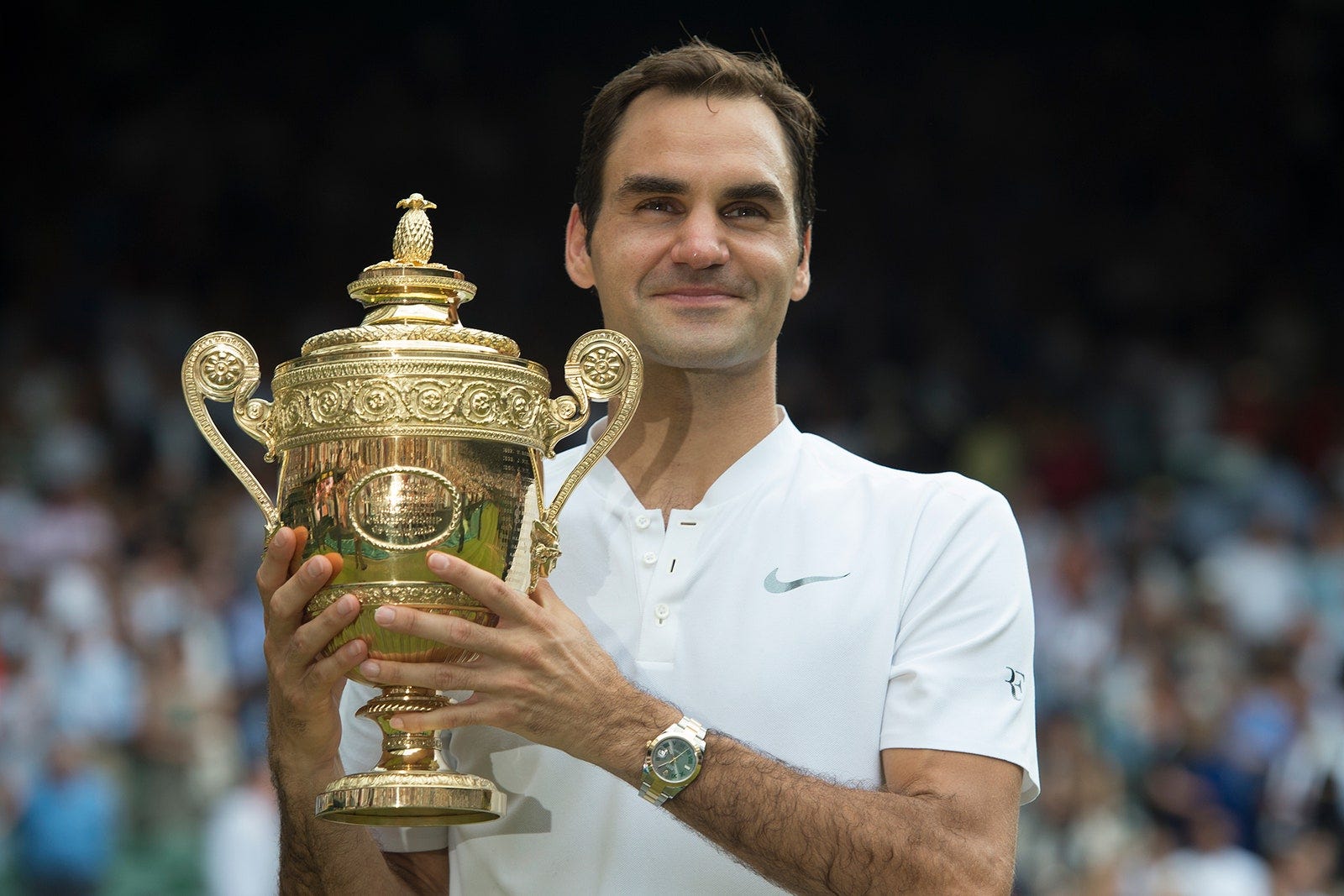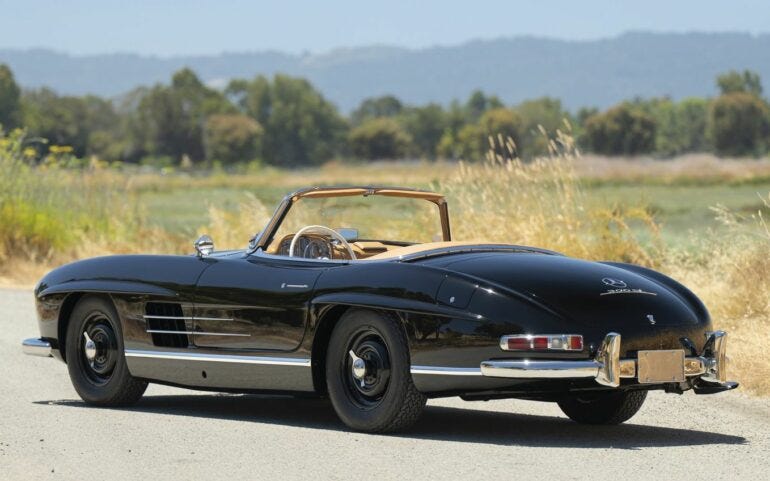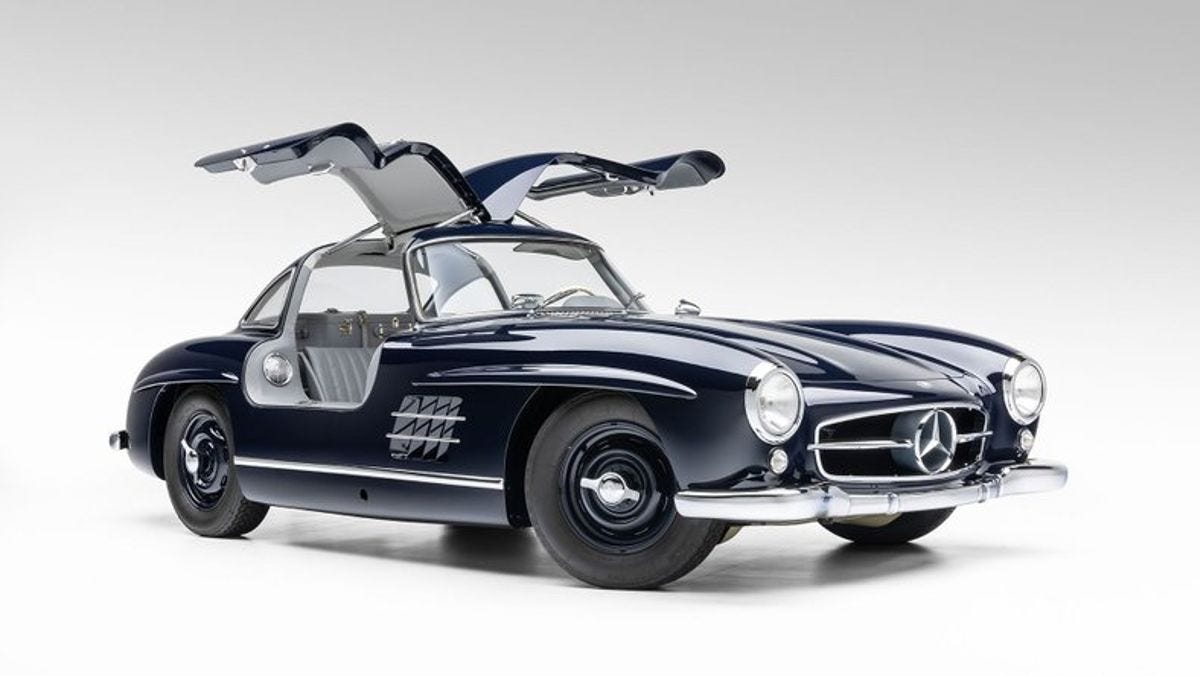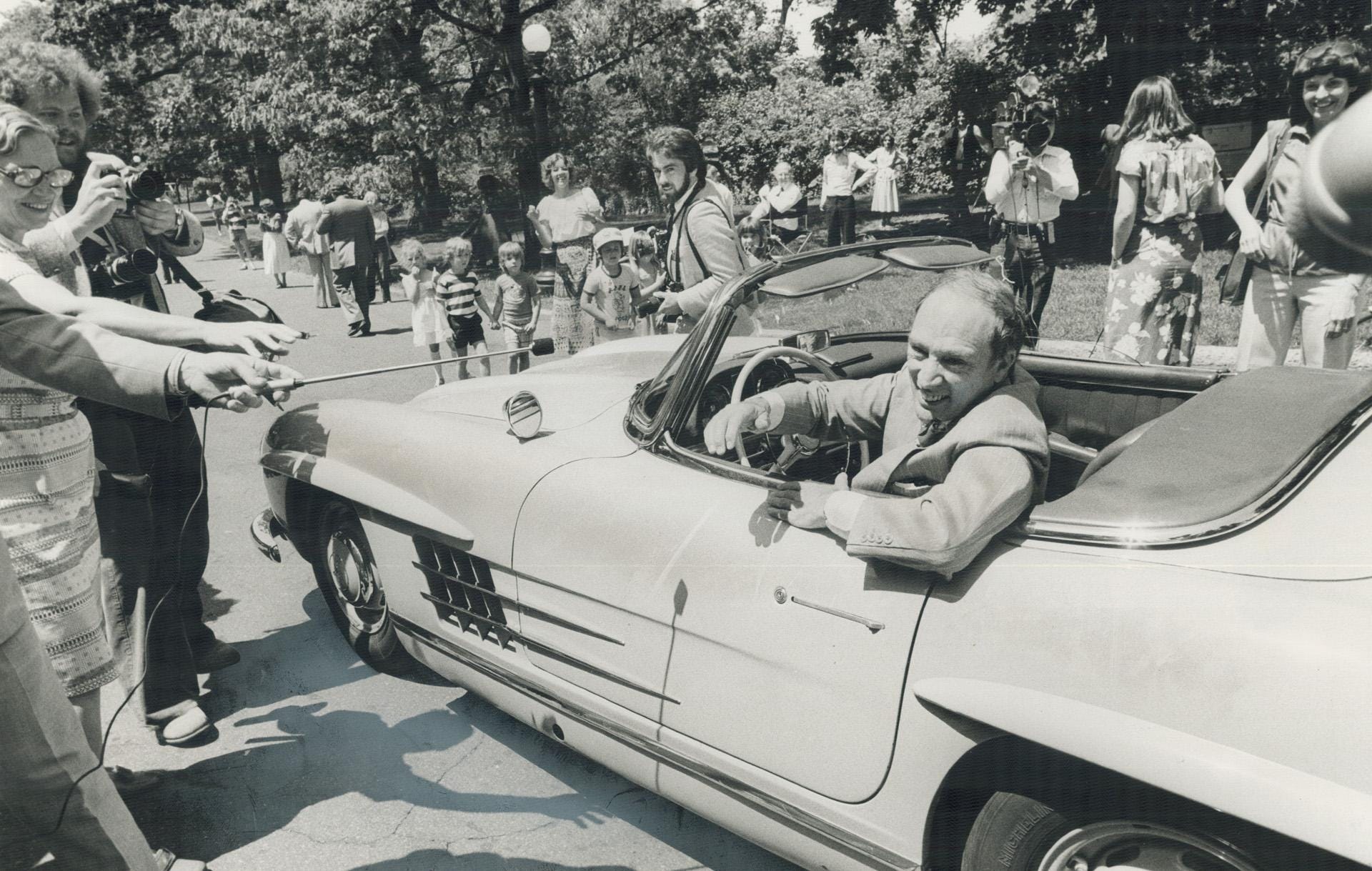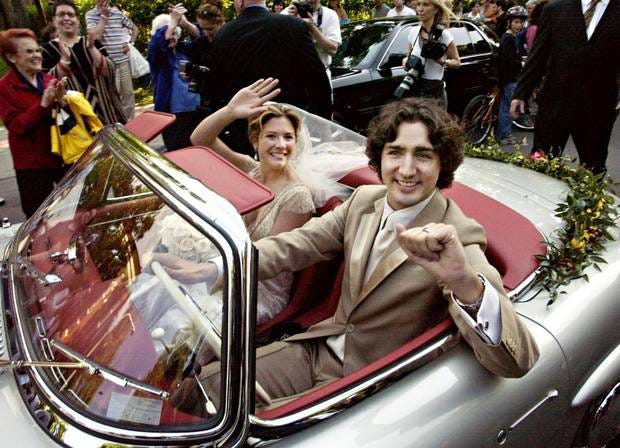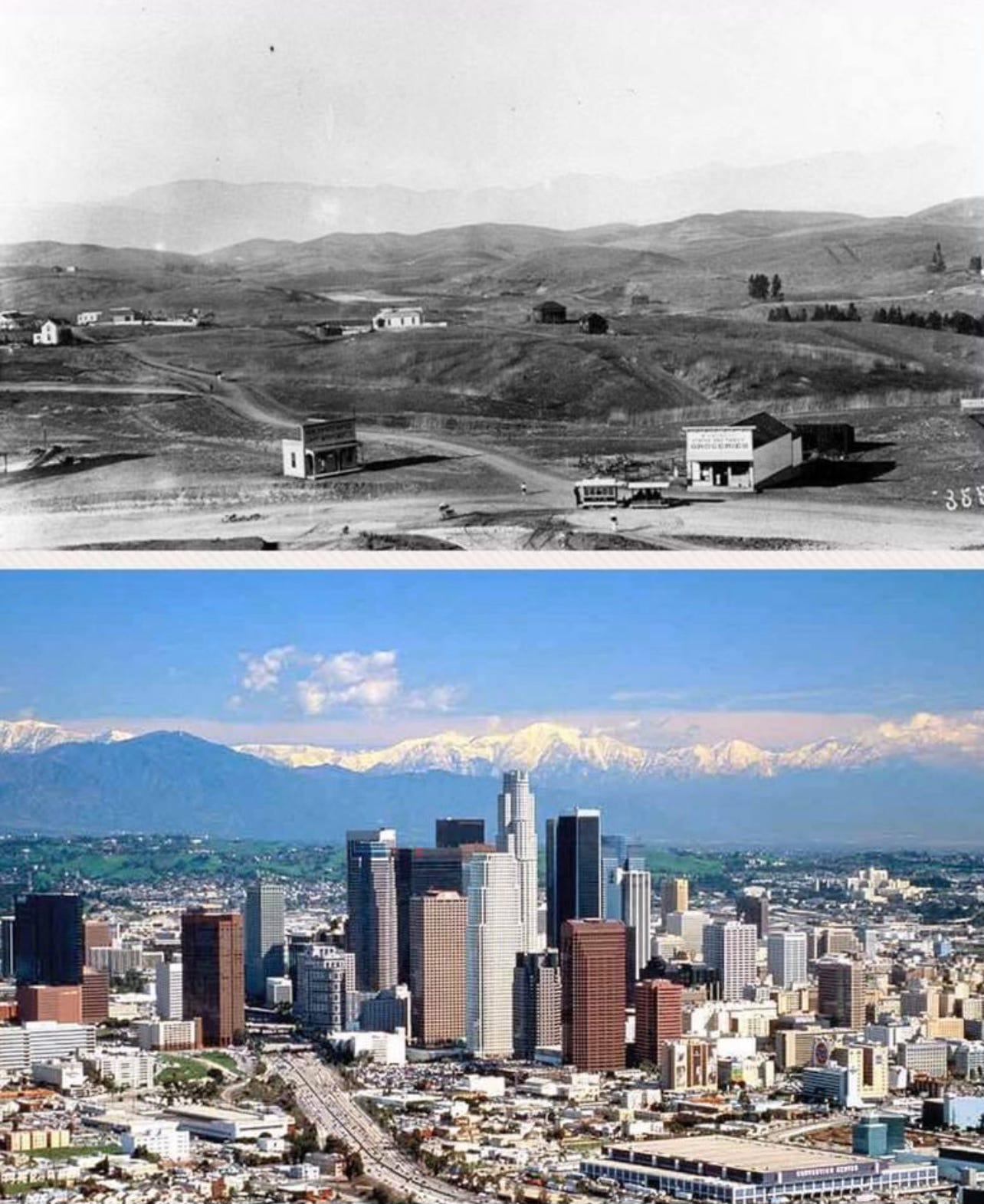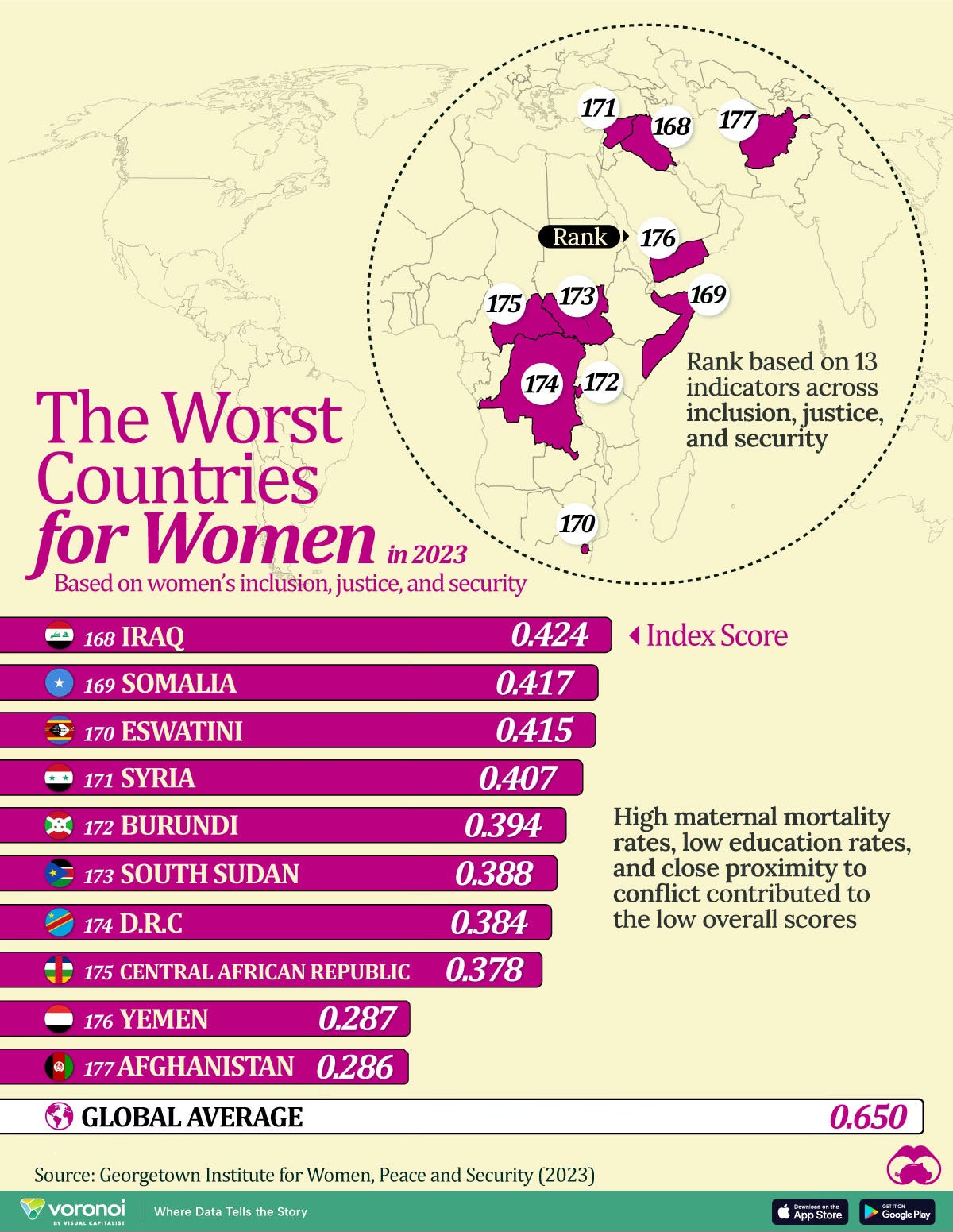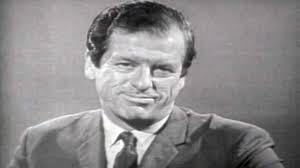Tennis `Chaos' at the US Open; the 300SL; and another great of Early TV News
September 2, 2024 Volume 5 # 12
The Tennis Shockers
Carlos Alcaraz and Novak Djokovic were both knocked out of the US Open, and both were handed humliating defeats; each leaves a lot of money behind. All Canadian players were dumped in the first round, except for Gabriel Diallo, an unknown who won more money this week than he had won in his entire short career. And he narrowly lost on Saturday.
Here is the record amount of cash on offer at the US Open:
“Anybody can win it,” said Djokovic. The loss by the Gold and Silver medal winners at the Olympics prompted an odd headline in The Wall Street Journal; Losses by Novak Djokovic and Carlos Alcaraz Threw the U.S. Open Into Chaos
Chaos?
The article closed by hoping an American man might win the first Grand Slam title since Andy Roddick did it, winning the US Open in 2003.
Another serious paper had a tennis article. The Economist had a long piece on why Coco Gauf may never be a true tennis great.
The reason: She can’t beat the Polish star, Iga Swiatek. The article says greatness was also denied Andy Roddick since he could never beat Roger Federer.
Here's a link to The Economist piece if you can open it
And Speaking of Money
Shocking for a Canadian that Australia and others are so far ahead. The Canadian government is anti-natural resources; Australia promotes them and it shows.
Maybe Roger Federer, with earnings of at least $550-million, helped the Swiss number.
Is that a Rolex that I see? Still making watch money in retirement.
The Mercedes 300 SL
and Canada’s Capital Gains Tax
Mercedes Benz made 1,858 models of this car between 1957 and 1963.
This particular car, which has hidden goodies such as the black paint job and special wheels, recently went on sale for $3.2-million
There is also the Gullwing, named for its doors. Mercedes made even fewer of these.
Its most recent sale price is $1.8-million, though one did sell for more than $3-million, a model made of special alloy made double that.
Pierre Trudeau, Canada’s Prime Minister from 1968 to 1984 (with a brief hiccup in 1979), drove a 300SL roadster, the convertible model. He was once lampooned for speaking to a group of striking workers from his Mercedes. The Trudeau Merc was in storage during his years as prime minister, though he brought it out after he lost the 1979 election to Joe Clark.
Pierre Trudeau showing off his Mercedes 300 SL as he goes to hand over power to Joe Clark in 1979. He would be back in power in early 1980, and the Merc was back in storage. It was brought out for his son Justin’s wedding in May of 2005.
The marriage is over but the second Prime Minister Trudeau still owns an asset worth about $3-million Canadian. Under his new capital gains tax, if he sold the car he would have to pay about two thirds of that in tax since the Mercedes would have cost his father only about C$12,000 new.
Los Angeles Then and Now: 1901 and 2001
Even the mountains look bigger.
Where Women Have a Terrible Life
Essay of the Week
This is another story of one of the early giants of television news. Stanley Burke was a CBC foriegn correspondent who went on to read the news. I interviewed him in 1999 when I wrote an obituary of his brother, Lieutenant-Commander Cornelius Burke, a war hero who won the DSC (the Naval Distinguised Service Cross) with two bars, an incredibly rare achievement). When I wrote the news test to apply to the CBC in 1967, I had no training, but I am a good mimic so I used my memory of Stanley Burke’s great voice to write the sample newscast. It worked.
Stanley Burke, who died last Saturday at the age of 93, was the first non-announcer to read the CBC’s nightly newscast. On the night he started, December 11, 1966, the name of the broadcast was changed to The National News. He was a newscaster who had been a reporter and a fearless war correspondent who had been to war. But Stanley Burke left his post as newsreader in 1969 to take up the cause of peace, in his case the vicious civil war in the Biafran region of Nigeria, and remained a crusader for peace for the rest of his long life.
Mr. Burke was brought home from Paris, where he was a foreign correspondent for the CBC, to take over the job as main reader of the CBC’s nightly news from Earl Cameron, an announcer. The man who fought to put him in the job was Bill Cunningham, another foreign correspondent who at the time was Executive Producer of CBC TV News.
“There was a huge fight over who could read the television news. The announcers were not allowed to write copy and the reporters were not allowed to read it. Stan’s importance is that he was the first reporter to read the news,” said Mr. Cunningham.
TV news was in its adolescence at the time, but still relied on reporting what the newspapers and wire services said. The idea was to have reporters initiate stories and make the news more immediate by having reporters read it.
“My point was that the person who delivers the news is in effect the final editor. He can change the meaning of the words by the inflection of his voice or a facial expression. Stanley was a journalist with experience in the field and he was perfect for the job,” said Mr. Cunningham.
There were other newsmen who were short listed for the job, including Norman DePoe, Michael Maclear and Knowlton Nash, who got the post but not until 1978. Mr. Burke was named to read the news from Sunday to Thursday; Lloyd Robertson was appointed as the reader for Friday and Saturday.
Critics liked the new reader.
“Burke’s image, while sufficiently dignified, is that of a newsman, not some stern, omniscient postmaster,” wrote the Globe’s TV critic Dennis Braithwaite. “Burke’s National News (with Lloyd Robertson providing a casual change of pace on Friday and Saturday nights) ranks as the most effective CBC telecast on the air today. Authoritative without being rigid…it has given the corporation a bright new image it sorely needed.”
Stanley Burke was born in Vancouver in 1923. His father, also Stanley, was a stockbroker with the firm Pemberton Securities. After high school in Vancouver he went to the University of British Columbia, then joined the navy in 1943, following in the footsteps of his older brother Cornelius. Both brothers commanded Motor Gun Boats, high speed patrol boats used to attack submarines and enemy shipping. Mr. Burke was stationed in Bermuda, Newfoundland and the English Channel.
After the war he led an unconventional life and took up a number of jobs. He studied agriculture at UBC with the ambition of becoming a farmer-writer. As part of his agriculture experience he worked as a deck hand on a ship carrying 800 head of cattle to China as part of a United Nations program. to feed war refugees. He was in Shanghai in 1947 and as a tease to his foreign correspondent future wrote about seeing Communist demonstrators there, and noting with surprise that western businessmen did not seem worried. The Communists took over in 1949.
Back in Canada he worked for the Edmonton Bulletin. His biggest scoop was applying for and receiving driver’s licences for a dog, a goat and a duck. The province reformed its licencing law after that embarrassment. When the Bulletin folded and he decided to try his luck in the nearby Leduc oilfield. He landed a good paying job as pipe-racker, but he didn’t last long.
“This man had to heave 90-foot lengths of pipe around and I found the pipe racker was getting racked more often than the pipe. To put it mildly I tired of the oil business,” Mr. Burke told an interviewer in the 1960s.
He tried operating a turkey farm in the Fraser Valley with 2,200 birds but the courses at UBC did not prepare him to deal with the delicate health of turkeys and many of them died. He soon found his true métier, working in newspapers.
“He was above the usual hack you sat beside at the Vancouver Sun you could see that he was destined for better things,” said the journalist Alan Fotheringham from his home in Toronto.
Stanley Burke was soon the Parliamentary correspondent in Ottawa for the Vancouver Sun. He travelled to the Arctic six times as part of that job and won a UN journalism competition, which led to a month long stay at the UN. He did some freelance broadcast work.
“He had to stand outside the house of commons and in a minute and half describe what had happened that day. Blair Fraser, was brilliant at it, Stanley less so,” said his friend of 50 years, Peter Trueman. In 1958 the CBC named Mr. Burke its correspondent at the United Nations in New York, replacing Charles Lynch.
“I gradually began to realize I was getting far more fun out of broadcasting than newspapering and decided to switch when the chance came,” said Mr. Burke at the time.
Working at the UN he travelled the world as well, and was in Berlin in 1961 when the wall went up between East and West. In January of 1962 Mr. Burke was named the Paris correspondent of the CBC, a job that meant covering France, but also conflicts in places such as Cyprus and Nigeria.
A man who had faced death at sea, he was fearless in the field. Many years later his local newspaper, the Amherst Island Beacon, recalled an incident during Algeria’s war for independence, where Mr. Burke and his camera crew had just witnessed the massacre of 79 unarmed civilians. One of the killers stuck a gun in his ribs demanding the film, but he refused and somehow survived.
He covered the death of one Pope and the installation of another. At the Vatican he had the camera pan up to a lightning rod on top of a crucifix. Great material for a closer: “Not really an act of faith, but reflecting the Church’s acceptance of the realities that have kept it alive for 2,000 years,” said Mr. Burke who was raised as a Roman Catholic.
Stanley Burke had a natural broadcast voice and a distinct delivery. He was good on radio but a natural for television. David Halton, who replaced him as the CBC’s man in Paris said he was made for the anchor role
“He was a man of great sophistication with craggy good looks. You knew he had done his time,” said Mr. Halton.
The end of his time in the newsreader’s chair came in 1969. Mr. Burke became transfixed by the Biafran War, a tragedy much like the war in Syria today. It was the War in Biafra that sparked John Lennon’s `bed in’ the same year.
Stanley Burke visited Nigeria and implored Canada and other governments to do something.
“The CBC gave Stanley an ultimatum. It was either Biafra or read the National News. Stanley, to his credit, gave up his salary of $30,000 a year, more than the president of the CBC, to remain true to his own conscience,” said Mr. Trueman.
Soon he was being interviewed on the CBC.
“Burke, Biafra and a Beatle – all on Action Set, Saturday December 27 at 11:03 am EST,” read the last paragraph pf a CBC press release on Stanley Burke’s last days at the CBC.
After the CBC Mr. Burke lived first in British Columbia, where he was owner and publisher of the Nanaimo Times. He later moved to Amherst Islands near Kingston. A strong environmentalist – he was one of the founders of Pollution Probe—he was against the growth of wind turbines where the St. Lawrence River joins Lake Ontario near his beloved island.
“Stanley and his wife Peggi were in the forefront in the fight against wind turbines here. It was one of his many crusades,” said his neighbour, Harold Reddekopp.
So far there are no wind turbines on Amherst Island, unlike nearby Wolfe Island. Along with his causes, Mr. Burke also wrote children’s fables and satires on Canadian politics.
Stanley Louis Burke was born in Vancouver on February 8, 1923. He died in Kingston, Ontario, on May 29, 2016. He is survived by his wife, Peggi Coulter-Burke, his children Brian, Kerry, Holly and Randy Burke; step-children Diana Coulter, Carolyn Coulter and Sheila MacNicol; as well as 13 grandchildren, seven great-grandchildren, and his former wife Daphne Burke.

